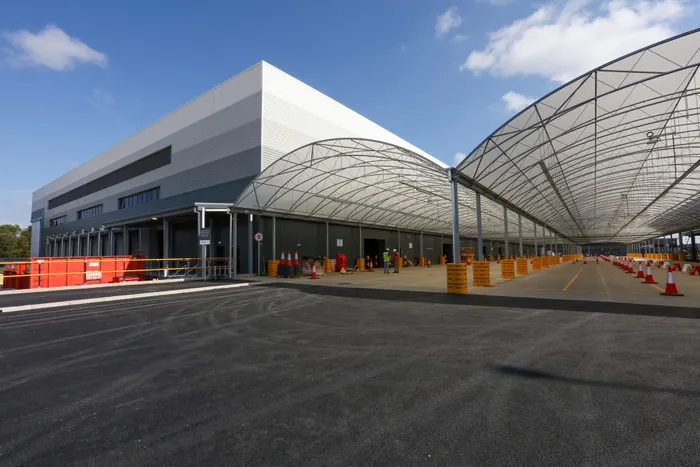
Equites’ UK portfolio included Amazon Fulfilment Centre in Peterborough, UK, but it sold the property in November 2024..
Image: Supplies
“I don’t think the UK has had as good a property portfolio for sale in several years,” is how Equites Property Fund CEO Andrea Taverna-Turisan described the market where the REIT plans to dispose of its seven large logistics facilities.
“The level of interest so far has been astounding. These are 100% highest quality logistics facilities, and we will certainly get our asking price and hopefully do better than that,” he said in an interview at the release of the annual results of the JSE’s only logistics-focused REIT.
The group delivered a distribution per share of 133.92 cents for the year to February 28, at the upper end of its previous guidance, after focusing on like-for-like rental growth in South Africa and the UK, limited vacancies, and the ability to generate revenue from renewable energy.
Equites’ UK portfolio delivered “exceptional rental growth” in the past year, with three assets undergoing rent reviews, resulting in uplifts of between 19% and 69%. The valuations have remained reasonably flat, showing a 1% uplift in terms of UK pounds.
Over the past nine years, Equites had acquired and developed 14 assets in the UK, with a cumulative development value exceeding £450 million and reaching a peak value of £550m before market conditions in the UK changed.
Following a reassessment of whether this capital allocation would yield the highest possible returns for shareholders, seven of these assets, along with the Newlands development platform, have already been sold.
“The board has now decided to explore the sale of the remaining UK portfolio. This decision was driven by the maturity of the existing assets and the opportunity to reinvest the proceeds in South Africa,” Taverna-Turisan said.
He explained that the basis for this decision included structural economic and political issues in the UK, the high cost of debt in the UK coupled with the high cost of equity in South Africa, the fact that the group believes it has extracted peak returns from its UK assets, and that it believes it can achieve better returns from the South African market.
The proceeds could significantly reduce the loan-to-value (LTV) ratio, currently at 36%, down from 39.6% a year before, and the funds would also be allocated towards an “aggressive development cycle in South Africa,” he said. There is currently R2.9 billion in cash and undrawn facilities on the balance sheet.
Plans were in place to reinvest the disposal proceeds into newly developed, ESG-compliant logistics facilities on long-term leases in South Africa, which would enhance shareholder value over the long term, said Taverna-Turisan.
In the past year, the low vacancy rate, high rental growth, and overall sector outperformance were fueled by growing demand from retailers and third-party logistics companies. Limited supply due to a shortage of appropriately zoned and serviced land, along with prohibitive funding costs for many developers, has further constrained availability. Demand for ESG-compliant space also remained a key theme driving demand, he said.
The group focuses on high-quality logistics properties, let to A-grade tenants on long-dated leases. Its R27.7 billion portfolio is 99.9% occupied, with global multinationals and large listed organisations forming the backbone of the tenant portfolio
.
Equites’ R21.1bn South African portfolio delivered like-for-like rental growth of 5.9%, valuation growth of 6%, and no vacancy at year-end. Several smaller, specialised, and non-ESG compliant assets have been disposed of over the past 24 months.
In South Africa, Equites completed a 16,721 square metre facility at Jet Park in March 2024, let to SPAR Encore. The group plans to develop the remainder of the Jet Park land within 18 months.
Equites also completed R195 million of improvements to the Shoprite Centurion facility. Two other Shoprite facilities were completed, both with 20-year leases – the R1.2bn, 80,531 square metre facility at Wells Estate, Eastern Cape, and a R1.3bn campus in Riverfields, Gauteng.
Three speculative developments were completed in the 2025 year, two of which were let before the practical completion date, and the third was let within three months of completion, demonstrating the intensifying demand for high-quality logistics assets in prime nodes.
The group is seeking electricity wheeling agreements with third parties. At year-end, the total solar generation capacity was 26.7 MW, with over two-thirds of the portfolio being supplied with solar energy. An additional 4.2 MW is expected to come online in 18-36 months. Taverna-Turisan said they still have 750 000 square metres of roof capacity for solar.
Thus far, the group has a wheeling agreement in the City of Cape Town and has six power purchase agreements in place.
Visit:weee.businessreport.co.za